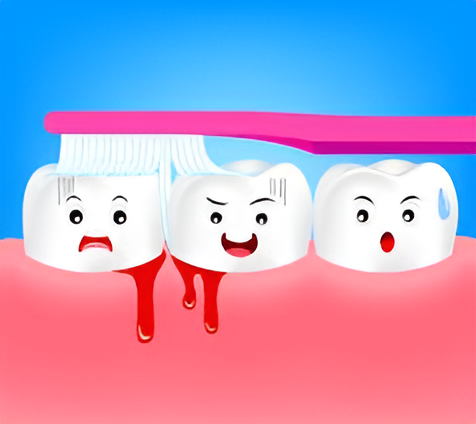Have you ever noticed a little blood on your toothbrush or in the sink after flossing and thought, “It’s no big deal, right?”
Think again.

Bleeding gums might seem minor, but they could be your mouth’s early warning signal — a red flag that something deeper is going on. At Dental Optima, we want you to understand just how important your gum health is, and how to take care of it before small issues become serious problems.
Gums bleed when they’re inflamed, irritated, or infected. The most common reasons include:
- Gingivitis – The earliest stage of gum disease caused by plaque buildup.
- Brushing too hard – Aggressive brushing can damage your gums.
- Poor oral hygiene – Skipping flossing or brushing lets bacteria thrive.
- Hormonal changes – Pregnancy, menstruation, or menopause can make gums more sensitive.
- Certain medications – Blood thinners and some heart meds may cause bleeding.
- Vitamin deficiencies – Low vitamin C or K can impact gum health.

From Gingivitis to Periodontitis: What’s the Risk?
Bleeding gums are often an early symptom of gingivitis, a reversible condition. But if left untreated, it can turn into periodontitis, a much more serious disease that can lead to:
- Gum recession
- Bone loss
- Loose teeth or even tooth loss
- Increased risk of heart disease and diabetes
Yes — gum disease isn’t just about your mouth. There’s growing evidence that poor gum health can affect your entire body.

Signs Your Gums Need Attention
If you notice any of the following, it’s time to schedule a dental visit:
- Gums that bleed when brushing or flossing
- Persistent bad breath
- Swollen, red, or tender gums
- Receding gum lines
- Pus between your teeth and gums
- Changes in how your teeth fit together when you bite
Even if the bleeding stops on its own — don’t assume the issue is gone!
How to Keep Your Gums Healthy
Good news: preventing (and even reversing early gum disease) is absolutely possible with the right care!
Here’s how to take charge:
- Brush twice a day with a soft-bristled toothbrush and fluoride toothpaste.
- Floss daily – yes, even when it feels tedious!
- Use an antibacterial mouthwash to reduce plaque and bacteria.
- Avoid Tobacco – it increases your risk of gum disease.
- Eat a balanced diet rich in vitamins and low in sugar.
- See your dentist regularly for cleanings and checkups.
Tip: If flossing makes your gums bleed, that’s actually a sign you need to floss more, not less. After a few days, the bleeding usually stops as your gums get healthier.

What We Can Do for You
At Dental Optima, we offer:
- Comprehensive gum evaluations
- Deep cleanings (scaling and root planing) to remove tartar below the gum line
- Laser gum therapy
- Personalized oral hygiene guidance based on your needs
Our team is trained to detect the earliest signs of gum disease — and treat it before it becomes a bigger issue.
Your Gums Deserve Love, Too

Healthy gums are the foundation of a healthy smile. Don’t let bleeding gums go unchecked. A few simple habits and a visit to your dentist can protect your smile for years to come.
Let’s Take Care of Your Gums Today
If your gums are bleeding or you’re due for a cleaning, we’re here to help.
Call us at +91 9354303488
Healthy gums. Healthier you.
From our chair to your home — we’ve got your smile covered.
